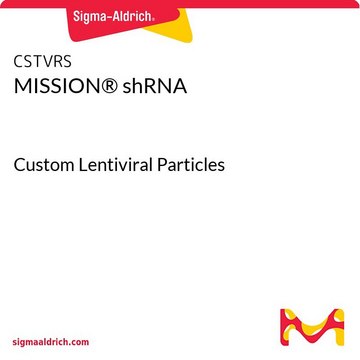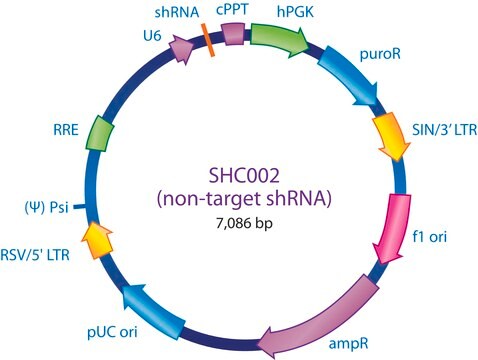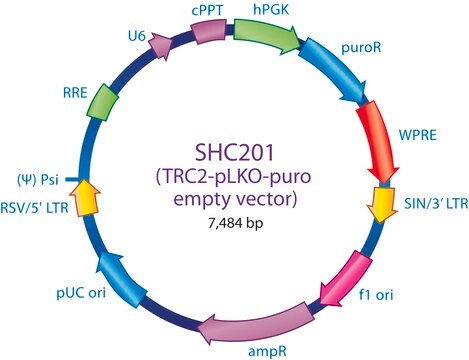SHC312V
MISSION® 1X LacO Inducible Non-Target shRNA Control Transduction Particles
Does not target any known genes
Zaloguj sięWyświetlanie cen organizacyjnych i kontraktowych
About This Item
Kod UNSPSC:
41106609
NACRES:
NA.51
Polecane produkty
Poziom jakości
linia produktu
MISSION®
stężenie
≥1x106 VP/ml (via p24 assay)
Warunki transportu
dry ice
temp. przechowywania
−70°C
Opis ogólny
Sigma® is proud to offer IPTG-inducible vectors as the latest development from our continued partnership in TRC.
The pLKO vector has been redesigned to contain a LacI (repressor) and a modified human U6 shRNA promoter with LacO (operator) sequences. In the absence of IPTG (isopropyl-Β-D-thio-galactoside), an analogue of lactose, LacI binds to LacO preventing expression of the shRNA. When IPTG is present, the allosteric LacI repressor changes conformation, releasing itself from lacO modified human U6 promoter, and subsequently allows expression of the shRNA.
The MISSION 1x LacO Inducible Non-Target shRNA Control Transduction Particles contain an shRNA insert that does not target any known genes, making it useful as a negative control in experiments using the MISSION inducible shRNA library clones. This allows one to examine the effect of transfection of a short-hairpin on gene expression and interpret the knockdown effect seen with shRNA clones. Ampicillin and puromycin antibiotic resistance genes provide selection in bacterial or mammalian cells respectively. In addition, self-inactivating replication incompetent viral particles can be produced in packaging cells (HEK293T) by co-transfection with compatible packaging plasmids. 200uL of 106 TU/ml (via p24 titering assay) lentiviral particles are provided as frozen stock.
When conducting experiments using MISSION® shRNA clones, the proper controls should be a key element of your experimental design to allow for accurate interpretation of knockdown results.
The pLKO vector has been redesigned to contain a LacI (repressor) and a modified human U6 shRNA promoter with LacO (operator) sequences. In the absence of IPTG (isopropyl-Β-D-thio-galactoside), an analogue of lactose, LacI binds to LacO preventing expression of the shRNA. When IPTG is present, the allosteric LacI repressor changes conformation, releasing itself from lacO modified human U6 promoter, and subsequently allows expression of the shRNA.
The MISSION 1x LacO Inducible Non-Target shRNA Control Transduction Particles contain an shRNA insert that does not target any known genes, making it useful as a negative control in experiments using the MISSION inducible shRNA library clones. This allows one to examine the effect of transfection of a short-hairpin on gene expression and interpret the knockdown effect seen with shRNA clones. Ampicillin and puromycin antibiotic resistance genes provide selection in bacterial or mammalian cells respectively. In addition, self-inactivating replication incompetent viral particles can be produced in packaging cells (HEK293T) by co-transfection with compatible packaging plasmids. 200uL of 106 TU/ml (via p24 titering assay) lentiviral particles are provided as frozen stock.
When conducting experiments using MISSION® shRNA clones, the proper controls should be a key element of your experimental design to allow for accurate interpretation of knockdown results.
Zastosowanie
To see more application data, protocols, vector maps visit sigma.com/shrna.
Informacje prawne
MISSION is a registered trademark of Merck KGaA, Darmstadt, Germany
Sigma is a registered trademark of Sigma-Aldrich Co. LLC
This page may contain text that has been machine translated.
polecane
Numer produktu
Opis
Cennik
Kod klasy składowania
12 - Non Combustible Liquids
Klasa zagrożenia wodnego (WGK)
WGK 3
Temperatura zapłonu (°F)
Not applicable
Temperatura zapłonu (°C)
Not applicable
Certyfikaty analizy (CoA)
Poszukaj Certyfikaty analizy (CoA), wpisując numer partii/serii produktów. Numery serii i partii można znaleźć na etykiecie produktu po słowach „seria” lub „partia”.
Masz już ten produkt?
Dokumenty związane z niedawno zakupionymi produktami zostały zamieszczone w Bibliotece dokumentów.
Nasz zespół naukowców ma doświadczenie we wszystkich obszarach badań, w tym w naukach przyrodniczych, materiałoznawstwie, syntezie chemicznej, chromatografii, analityce i wielu innych dziedzinach.
Skontaktuj się z zespołem ds. pomocy technicznej





